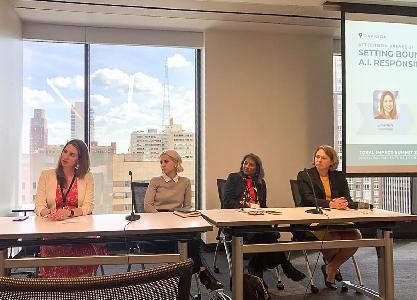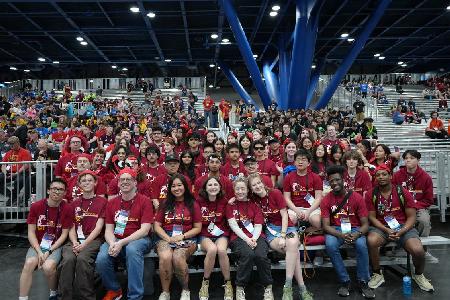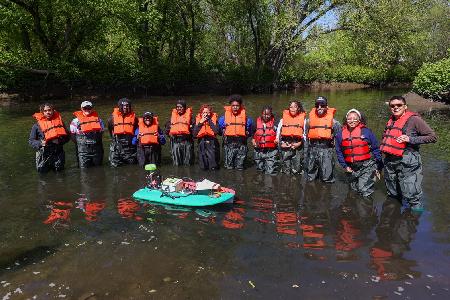
Technical.ly is one of 22 news organizations producing Broke in Philly, a collaborative reporting project on solutions to poverty and the city’s push toward economic justice.
I have been laid off since the beginning of the pandemic. Even though it was a job to get me by until I graduate, it was a job I relied on to take care of myself and my family.
I wasn’t sure what to expect while applying for unemployment, but I did expect to be called lazy, entitled, and good-for-nothing by people who judge others based on what and how much they earn. Contrary to these judgmental beliefs, I survived a pandemic this long while being immunocompromised, caring for three people, searching for employment, battling with my mental health, all while being a full-time student.
This pandemic took a real toll on me and many other young people whose mental health plummeted during the pandemic.
Like many students across the nation, I had to navigate being a full-time student in a virtual learning environment for the first time, missing out on opportunities to make connections with my classmates, network with faculty, and get to know my professors from whom I will one day need recommendation letters.
And like many young people who are caregivers, I struggled with caring for older family members, one of whom I lost during the pandemic; I am still processing that grief and loss. I dealt with all of this while filing for benefits every two weeks just to be able to continue to pay my bills, constantly worried about whether there would be a glitch in the system or something else that would cause me to miss benefit payments. In writing this op-ed, I wanted to share my reality as opposed to the misconceptions about young people’s realities that has caused us to be left out of every pandemic relief package that was introduced.
There is this common misconception that young people had family and friends to rely on for financial support during this crisis, but for young people like myself, we did not have a safety net, we were the safety net.
If we want to see policies implemented to combat issues that disproportionately affect young people, we need a seat at the table.
The only way to change this is to have directly impacted people lead these conversations and changes, which is exactly what the Youth Justice Project policy report does. If we want to see policies implemented to combat issues that disproportionately affect young people, we need a seat at the table. The world is reopening, and we cannot allow young people to enter back into a society that isn’t sustainable.
This week, important pandemic-related income assistance programs such as Pandemic Unemployment Assistance, Pandemic Emergency Unemployment Compensation and Federal Pandemic Emergency Compensation will expire. As this day approaches, time is running out and millions of people will be without income to sustain themselves and their families.
I spoke with many people who are also unemployed and they all experience the same issues as me: offers for jobs that pay low wages, or no job offers at all. After weeks of applying to jobs, I landed one job offer which was for a job that wasn’t even enough to live on.
If I take this job, I won’t be able to afford my bills, if I don’t take this job, I can’t file for unemployment due to strict work search requirements and rules around refusing work. This is further proof that the unemployment compensation system was not designed to help workers find work that will enable them to provide for themselves in their families, but instead to give them just enough benefits to send them back into a workforce that does not value their hard work and dedication.
Since the beginning of the pandemic, employers and business owners have been complaining and urging legislators to shut off benefits, saying that workers are lazy and would rather stay home and collect unemployment than work. People have talked about workers making more money on unemployment than they did while working, to insinuate that workers are being greedy for wanting to receive an income that actually affords them a quality of life.
The problem isn’t a labor shortage because of unemployment benefits, the problem is jobs are paying wages that are too low for workers to sustain.
I wrote this report to create awareness around these issues in hopes of returning to a society where I don’t have to be overworked at a job that doesn’t pay me enough to support my family, let alone myself.
Young people deserve to return to a society where their sole purpose is to not be a laborer, but to become the best version of ourselves. I hope readers walk away from the section I wrote with a newfound appreciation for young people’s realities as workers, caregivers, students, leaders, all of the above.
_
Madison Nardy is one of three authors of a Community Legal Services report titled “How the Pandemic Response Has Failed Young People & What We Need to Thrive.”
Read the full reportJoin the conversation!
Find news, events, jobs and people who share your interests on Technical.ly's open community Slack

Philly daily roundup: Minecraft in a Philly school; PTW kicks off; Tech and art happy hour

Philly daily roundup: Philly's top innovation leaders; City buildings go solar; PTW kicks off on Friday

Philly daily roundup: UPenn's AI master's degree; Advice for EDA Tech Hubs; Last day of ACP


